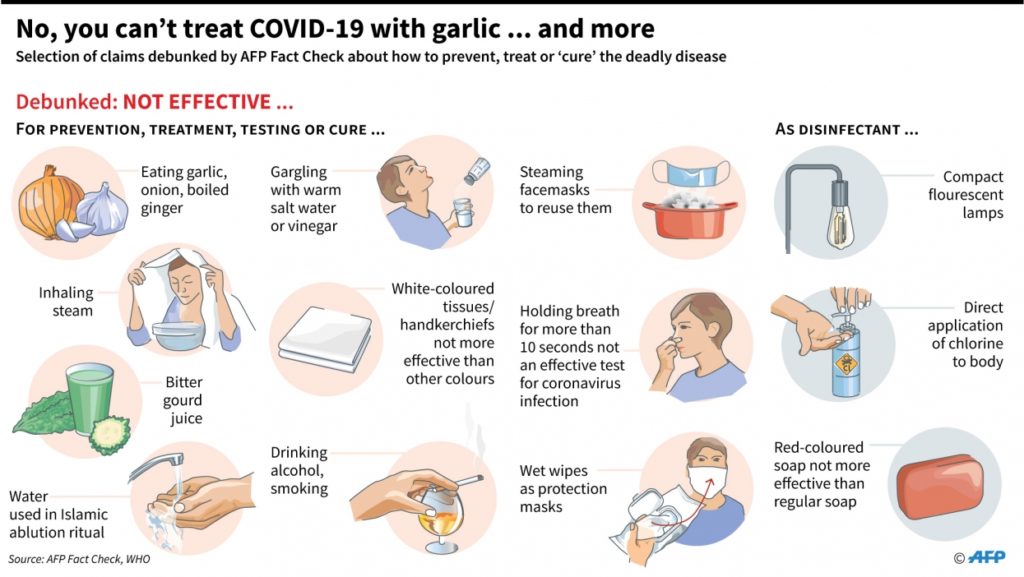Last update: 23 March 2021
At the heart of reporting on the COVID-19 pandemic, is reliable information on the implications and spread of the virus. Institutes such as John Hopkins University and national public health authorities keep track of the number of confirmed cases of corona and deaths and are trustworthy sources of information. The World Health Organisation and the Centers for Disease Control and Prevention disseminate reliable and intelligible information on how to protect oneself against COVID-19 and how to stop the spread of the virus.
However, the current pandemic also seems to be accompanied by an infodemic, a term referring to false claims, rumours and mis- and dis-information surrounding the coronavirus. Since the start of the pandemic, unsubstantiated information on COVID-19 has been spreading fast on social media, but in some cases has also been disseminated by governments. As the World Health Organisation’s Director-General remarked in the beginning of the COVID-19 crisis, ‘We are not just fighting an epidemic; we are fighting an infodemic.’ Disinformation connected to COVID-19 is dangerous, as ‘[i]t leads to citizens endangering themselves by ignoring scientific advice; it amplifies distrust in policy makers and governments; and it diverts journalists’ efforts towards reactive disproving of falsehoods instead of proactive reporting of new information’.[1] In some countries, however, dis-information is perpetuated by the government, leading to independent media having to take over the role of the government by transforming into public health information sources.[2]
Learn more
Dis-information refers to false information that is deliberately created and shared with the intention of causing harm.
Mis-information refers to information that is false, but not created nor spread with bad intentions.[3]
A number of organisations have released resources on common myths surrounding COVID-19 and on how to combat mis- en disinformation. Some organisations, including AFP Factcheck, have debunked coronavirus myths through their own research; at the moment of writing they have published 812 fact-checks on their website. The same goes for the Wold Health Organisation, which has compiled a list of mythbusters on their website.

Due to the pandemic, it has become hard for newsrooms to send their own reporters to countries heavily affected by the coronavirus. At the same time, local journalists suffer from work restrictions and an ongoing loss of income. COVID-19 Collaboration Wire is a Hostwriter tool that seeks to support quality journalism in times of travel restrictions due to the Coronavirus pandemic. It helps connect editors with journalists all over the world ready to fact-check, research and report from their regions.
Furthermore, this resource by the ACOS Alliance offers a tool for news organisations to adopt safety protocols that respond to the extraordinary circumstances created by the COVID-19 pandemic. This document pays special attention to working with freelancers, including best practices around key issues like accreditation, PPE (personal protective equipment), insurances and expenses.
Resources
- COVID-19 Expert Database: public health experts offering relevant COVID-19 insights for journalists, fact-checkers, and community information leaders (Meedan)
- CPJ Safety Advisory: Covering the Coronavirus Outbreak (Committee to Protect Journalists)
In English, French, Spanish, Portuguese, Arabic, Russian, Turkish - Tips for Journalists Covering COVID-19 (Global Investigative Journalism Network)
In English, French, Spanish, Portuguese, Arabic, Chinese, Japanese, Hindi, Vietnamese, Tigrinya, Swahili - The New Coronavirus and COVID-19 Handbook for Media (BBC Media Action)
In English, Ukrainian, Romanian - Communicating in Public Health Emergencies (BBC Media Action)
In English, French, Arabic, Russian, Belarusian, Ukrainian, Armenian, Azeri, Georgian, Indonesian, Romanian, Swahili, Bangla - Covering COVID-19: Concepts, Sources, Treatments and More (IJNet)
- COVID-19 Reporting Guidelines (International Media Support)
- Media Ethics, Safety and Mental Health: Reporting in the Time of Covid-19 (Ethical Journalism Network)
- Fighting the Coronavirus Infodemic (New America)
- #CoveringCOVID: 6 Recommendations for Combating Disinformation (IJNet)
- Disinfodemic: Deciphering COVID-19 Disinformation (UNESCO)
In English, French, Spanish - Disinfodemic: Dissecting Responses to COVID-19 Disinformation (UNESCO)
In English, French, Spanish - The CoronaVirus Disinformation System: How It Works (Bellingcat)
- Online Course ‘Covering Coronavirus’ (First Draft)
- Essential Guide to Verifying Online Information (First Draft)
- Our Top 10 Tips for Media in the COVID-19 ‘Info-demic’ (BBC Media Action)
- Investigating Coronavirus Fakes and Disinfo? Here Are Some Tools For You (Bellingcat)
- Covid-19: How to Keep Your Audience Informed (Deutsche Welle Akademie)
- Infodemic Toolkit for Fighting Disinformation on COVID-19 (Radio Nederland Training Centre)
- 6 Tools and 6 Techniques Reporters Can Use to Unmask the Actors behind COVID-19 Disinformation (Global Investigative Journalism Network)
Footnotes
[1] UNESCO, Disinfodemic: Deciphering COVID-19 Disinformation[2] Free Press Unlimited, COVID-19, Gender and Media
[3] Council of Europe, Information Disorder: Toward an Interdisciplinary Framework for Research and Policy Making
